Topic: Intensive Groundwater Use Control Area (IGUCA)

Interview of Ron Hein, April 16, 2021
Interviewed by Alan Conroy
Ron Hein, former legislator, lobbyist, and lawyer speaks about his 47 years in and around the Kansas Legislature and his impact on Kansas policy. He ran first for the House in 1974 in a 7-way primary which he won. Two years later he ran for the Senate, winning after extensive door-to-door campaigning against a well-known Senator, Bob Storey. He was just 25 when he was sworn into the Senate in 1975, Hein tells some interesting anecdotes about working with Speaker Pete McGill and Senate President Ross Doyen, particularly in his first years in the legislature. Hein Show Moresponsored or cosponsored 142 pieces of legislation on a wide variety of topics. His interview recounts the difficulty he had getting the Higher Education Loan program passed when he was in the House. Ultimately it failed the first year but passed the second. Hein noted the lack of lawyers in today's legislature is detrimental to the process, as is an increased lack of civility. The interview concludes with Hein discussing his lobbying career and why he felt he needed to leave elected office when T. Boone Pickens approached him to represent Mesa Petroleum. Hein notes that he has been more successful getting legislation passed as a lobbyist than as a legislator. Show Less

Interview of John Solbach, June 11, 2021
Interviewed by Alan Conroy
John Solbach served in the Marines, was wounded in combat in Vietnam, returned to Kansas to finish college and law school and ran for the Kansas legislature in 1978. He represented Lawrence/rural Douglas country in the House for 14 years. Solbach's interview is replete with entertaining stories, starting with his Populist ancestors' takeover of the Kansas House in 1890, to stories about how Mike Hayden helped him get a $4,000 appropriation to bring David Eisenhower to Kansas. He teamed up with Wint Winter Jr. to pass a Uniform Conservation Easement Law in spite of Sen. Ross Doyen; Show More he and R.H. Miller stopped a group of rural electric cooperatives from taking the Wolf Creek Nuclear plant out from under the control of the Kansas Corporation Commission. Solbach considers the sentencing guidelines, passed in 1992 while he chaired the House Judiciary Committee as the best legislation of his career. Show Less

Interview of Tracy Streeter, April 30, 2021
Interviewed by Rex Buchanan
In this 2021 oral history interview, Tracy Streeter reflects on his 14 years as Director of the Kansas Water Office under four governors. As recalled here, the early years of the 21st Century saw the efforts of the Kansas Water Office move from planning and policy-making to implementation. Streeter discussed issues involving water reservoirs that have become an integral part of water management in the state. He also reflected on the number of state agencies involved in development and implementation of water policy in Kansas and the dynamics of the Natural Resources Sub-cabinet under Governor Sebelius Show Moreas well as changes that occurred when the policy planning time horizon was increased dramatically through the water visioning process initiated by Governor Sam Brownback. Show Less
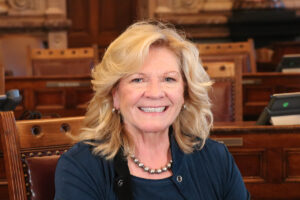
Interview of Jayne Aylward, June 18, 2021
Interviewed by Alan Conroy
Jayne Aylward's Oral History Interview described her experiences as one of the youngest members of the Kansas House of Representatives. Aylward was elected in 1978 from the 74th District in Saline County, Kansas. She served from 1979 to 1990 when she resigned to become an administrative tax judge with the Kansas Board of Tax Appeals. She later became a Certified Public Accountant specializing in tax matters. At the time of this interview Aylward was a rancher and stockwoman in addition to having a tax practice in Salina. During the interview she discussed her interest in Show Moreagriculture and taxation which came from growing up on her family farm and her participation in 4-H showing cattle. During the 1985-1986 legislative session, she was the Chair of the House Communications, Computers and Technology Committee. She also served on the House Federal and State Affairs Committee and the House Taxation Committee, both of which handled high-profile issues that she discussed in the interview, including reappraisal and classification of property taxes, and a constitutional amendment authorizing the Kansas lottery. Show Less

Interview of Kent Glasscock, June 11, 2021
Interviewed by Alan Conroy
As Majority Leader, and then as Kansas House Speaker, Kent Glasscock found ways to work productively with the conservative wing of the Republican caucus. The first part of the interview describes how Glasscock decided to run for office and his six campaigns.
As he moved up in leadership, the interview talks about several situations where his views as a moderate Republican clashed with the growing number of conservatives in the Republican caucus. Finally, Speaker Shallenburger called Glasscock to his office and together they made peace and subsequently worked well together. Glasscock cites the school finance bill that Show Moredealt with a capital outlay for school buildings as one of his best, most long-lasting accomplishments as well as the Confined Animal Feeding legislation. Styling himself as a true "policy wonk", Glasscock's descriptions of legislative antics in passing legislation are really interesting. This interview gives a picture of how the legislature transitioned to conservative control during his 12 years in office. Show Less

How Things Got Done in the Kansas Legislature
In this video, compiled from interviews on this site, 12 former Kansas legislators who served from 1960-2010 talk about why they ran for public office, how they developed and executed strategy, and how different leaders perceived their roles and what they accomplished. Among others you will hear Dick Bond describe initiating renovation of the Capitol, Steve Morris recall creating a plan to train more engineers, and Fred Kerr explain the need for reappraisal and classification. You also hear Mike Hayden recount lessons learned from two Speakers with vastly different styles who preceded him – Pete McGill and Wendell Show MoreLady. Show Less
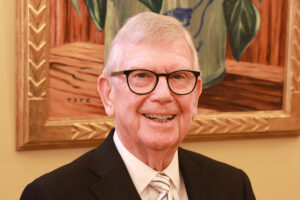
Interview of Gary Sherrer, October 15, 2021
Interviewed by Mike Matson
Gary Sherrer was a debater and it changed his life. His reflections on growing up in Topeka, winning a debate scholarship to Kansas State Teachers College and then teaching for eight years are the perfect backdrop to his later achievements. His association with the Graves Trucking Company and soon-to-be-Governor Bill Graves paved the way for him to become Bill Graves' Lt. Governor. Sherrer won the respect of many Kansas leaders, including Henry Bubb and Jordan Haines, two preeminent bankers who recruited him to the banking industry as chief marketing officer, and later, lobbyist when multi-bank holding company Show Morelegislation was pending. His debate skills served him well as a lobbyist, enabling the controversial bill to pass by one vote. He developed the Leadership Kansas model to train leaders. He knew how to solve community problems and displayed those skills as Secretary of Commerce for Governor Graves. One of his proudest accomplishments was the STAR bonds project in Wyandotte County, with Mayor Carol Marinovich. The interview is replete with examples of programs he developed or guided to fruition. It is interesting to read all the anecdotes about the political scene. Show Less
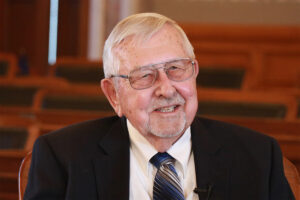
Interview of Jack Wempe, September 28, 2021
Interviewed by Alan Conroy
Jack Wempe of Rice County gave a detailed interview about the decade of the 1990's he spent in the Kansas House of Representatives. He played pivotal roles in the passage of the 1992 school finance bill and legislation to consolidate governance in higher education. He worked with members of both parties to pass legislation important to rural communities as well as education. Wempe became interested in taxation and economic development. Wempe also comments on the shift in philosophy of the Republican party during his time in office and its move to a more conservative leadership. Show MoreAt the conclusion of his legislative service, Wempe was appointed to the Board of Regents where he became chair in 2003.
Another interview of Wempe is included in the Leaders in Kansas Education collection on this site.
Show Less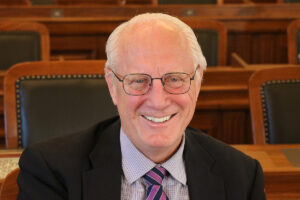
Interview of Joe Knopp, October 15, 2021
Interviewed by Alan Conroy
Joe Knopp's interview takes place 33 years after he left the legislature in 1988 after losing a close election and short-circuiting his political career. His recollections are still vivid and his interview describes a legislature that has changed considerably in recent years.
Knopp served from 1981 through 1988 and during that time as chair of the House Judiciary Committee was involved in many significant issues: medical practice, corporate hog farming, changes in the DUI law, death penalty, reapportionment, severance tax. As Majority Leader he dealt with a growing split in the Republican caucus --led by the Rebels. Show More He tried to get votes for a special session on a new highway plan. He describes in detail the process of getting elected to a leadership position and how he won by one vote. He talks candidly about balancing his personal views with those of his constituents, particularly on liquor and gambling issues --and he speaks analytically about losing the election in 1988 and again in 2012 when he ran for the Senate. Good insights for anyone contemplating a run for public office. Show Less
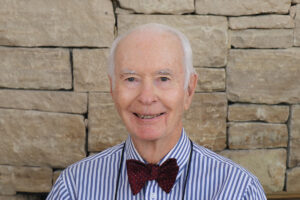
Interview of Fred Six, December 4, 2021
Interviewed by Richard Ross and Deanell Tacha
In this oral interview, former Kansas Supreme Court Justice Fred Six recounts his career as Judge of the Court of Appeals and Justice of the Kansas Supreme Court, reviewing changes in procedure that took place during his years on the bench and topics of litigation the courts reviewed. Six explained how the Supreme Court operates, especially as he discussed the "growing pains" brought about from the "IT Revolution." He described precedent-setting opinions and the process of writing a dissent. His discussion of the medical malpractice issues highlighted the tension between the courts and the legislature. After Show MoreJustice Six left the bench, he was asked to work with the Senate and House Judiciary committees to alter the Merit Selection plan of judges. work which was ongoing until 2011. The interview concludes with him stating that his greatest takeaway from his years of service was the establishment in 1992 of the Lawyers Fund for Client Protection. Show Less
